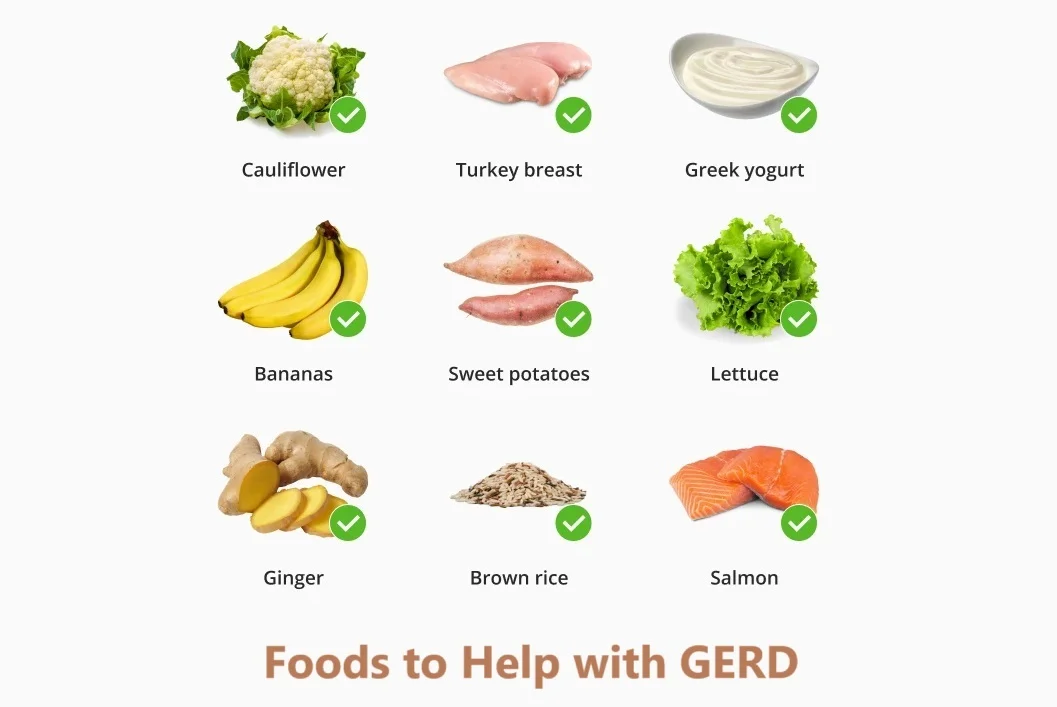
With symptoms like heartburn, regurgitation, and discomfort, GERD, or gastroesophageal reflux disease, can be incredibly frustrating. Read more. Managing GERD often involves avoiding trigger foods.
But there is a problem; identifying beneficial foods that can soothe and prevent symptoms can be equally challenging. If you’re like many people, it can feel overwhelming to sort through all the advice and figure out what really works.
That should be a problem half-solved now that you’ve found this list. On this page, we’ll cut through the confusion and provide a clear, detailed list of GERD-friendly foods.
But we won’t stop at that; we will also provide helpful tips on how to incorporate these foods into your diet. Keep reading.
So, What is GERD
GERD, or gastroesophageal reflux disease, is a chronic condition where stomach acid frequently flows back into the esophagus. This backwash of stomach acid is known as acid reflux and it can lead to irritation of the lining of the esophagus.
Symptoms of GERD are varied. However, the most common ones typically include the following;
- Heartburn
- Regurgitation of food or sour liquid, and
- Difficulty swallowing.
GERD can result from a variety of factors including lifestyle habits, diet, obesity, pregnancy, or certain medical conditions like hiatal hernia. To manage GERD effectively, the first step usually is to understand what triggers your symptoms.
For example, foods and drinks that relax the lower esophageal sphincter or increase stomach acid can exacerbate GERD. You will want to avoid these triggers and include GERD-friendly foods, such as those rich in fiber, and consider adding a fenugreek supplement to help soothe the digestive tract and reduce symptoms.
What are the Dietary Guidelines for GERD?
When it comes to GERD management, your diet plays a very key role. This is because there are specific foods that can trigger symptoms and those that can help alleviate them.
The dietary guidelines for GERD including avoiding triggers and incorporating foods low in acid and fat but high in fiber to your diet. Common triggers include spicy foods, fatty foods, caffeine, and chocolate. For effective symptom management, focus on what you can eat rather than just what you should avoid.
Adding GERD-friendly foods to your diet can help soothe the esophagus, reduce acid production, and improve overall digestive health. With that out of the way, here is a comprehensive list of foods to help with GERD;
· High-Fiber Foods
High-fiber foods help move food through the digestive system more efficiently. This action can reduce the risk of acid reflux.
High-fiber foods also help you feel full longer which can reduce the likelihood of overeating. Examples of high-fiber foods include oatmeal, whole grains, brown rice, and vegetables like carrots and sweet potatoes.
· Non-Citrus Fruits
Fruits are generally healthy. However, there are some that may trigger GERD symptoms due to their acidity.
Non-citrus fruits are typically gentler on the stomach. Examples include bananas, melons, apples, and pears. These fruits are not only nutritious but also less likely to trigger reflux symptoms.
· Lean Proteins
Lean proteins are a great choice for managing GERD because they are low in fat and easy to digest. Fatty meats can relax the lower esophageal sphincter and worsen your reflux symptoms.
So, opt for lean proteins like chicken, turkey, fish, and tofu. These fatty meat alternatives can provide essential nutrients without the added fat.
· Healthy Fats
We acknowledge that fatty foods can trigger GERD. But, healthy fats are a necessary part of a balanced diet. They can help reduce inflammation and provide long-lasting energy.
If you’re wondering what healthy fats are, think of avocados, nuts, and olive oil. These fats can be incorporated into meals in moderation to support your overall health.
· Alkaline Foods
Alkaline foods can help neutralize stomach acid and reduce reflux symptoms. These foods have a higher pH and can balance the acidity in the stomach.
Examples include spinach, kale, and cucumbers. Add these foods to your diet to help maintain a balanced pH in your stomach.
· Ginger and Herbal Teas
Ginger is known for its anti-inflammatory properties and can help soothe the digestive system. It can reduce symptoms of acid reflux and is also easy to incorporate into your diet. Moreover, ginger’s natural ability to enhance digestion and reduce bloating further underscores the benefits of ginger for those managing GERD. Incorporating it into your routine, whether in meals or as a tea, can provide consistent relief while supporting overall digestive health.
You can add fresh grated ginger to meals or enjoy ginger tea for a calming effect. Speaking of ginger tea, caffeinated drinks can trigger GERD, but herbal teas are a soothing alternative.
Herbal teas like chamomile and licorice tea can help reduce inflammation and soothe the digestive tract. These teas are a great way to stay hydrated while managing GERD symptoms.
· Aloe Vera Juice
Aloe vera juice is known for its soothing properties and can help reduce inflammation in the digestive tract. So, you may want to start by drinking small amounts of aloe vera juice to help manage or reduce GERD symptoms. It is best to choose pure, unsweetened aloe vera juice to avoid added sugars.
How to Best Incorporate GERD-Friendly Foods into Your Diet
If you’re getting started with GERD foods, incorporating them into your diet may not be so smooth sailing. But with a bit of planning, it should get easy with time. Here is how to incorporate GERD-friendly foods into your diet;
- Start by meal planning for the week, focusing on foods that are high in fiber, lean proteins, and healthy fats.
- Cook using healthier methods like baking, steaming, and grilling to avoid adding extra fat.
- Mindful eating is also crucial. So, try eating smaller, more frequent meals to prevent the stomach from becoming too full, which can trigger reflux.
- Avoid eating right before bedtime to reduce nighttime symptoms.
- Drinking herbal teas and staying hydrated throughout the day can also help manage symptoms.
In addition to dietary changes, certain lifestyle modifications can help manage GERD. Key ones include;
- Maintaining a healthy weight to reduce pressure on the stomach and lower esophageal sphincter.
- Elevating your head while sleeping to prevent acid from flowing back into the esophagus during the night.
- Wearing loose clothing to reduce pressure on the stomach, and
- Managing stress through techniques like yoga and meditation to help reduce symptoms.
Closing Thoughts
To best manage GERD, you will first want to understand which foods can trigger symptoms and which can help reduce them. Coupled with mindful eating and lifestyle changes, these dietary adjustments can help you manage GERD more effectively.
Consult with a healthcare provider for personalized advice and to ensure these recommendations fit your specific needs. If you’re in Singapore, we invite you to schedule an appointment with a specialist at Gastrohealth Clinic @ Gleneagles for a thorough assessment and tailored GERD management. See details below;
Gastrohealth Clinic @ Gleneagles – Dr Bhavesh Doshi | Gastroscopy | Colonoscopy | Health Screening | EUS and ERCP Singapore
6A Napier Rd, #05-35C Gleneagles Hospital Annexe Block,
Singapore 258500
+65 6355 5773





